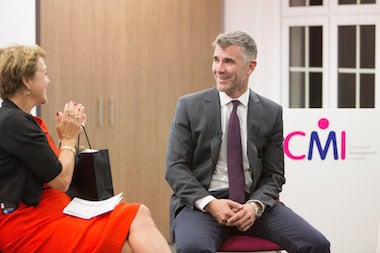Ivan Massow on Bouncing Back From Failures
Tuesday 01 December 2015
Ivan Massow knows what it’s like to fail. He founded Britain's first financial advisory firm for gay clients in 1990, aged 23, from a squat in Kentish Town and grew the company into a multi-million pound turnover business before watching it go bust in 2002 despite several mergers.
That same year Massow was sacked as chairman of the Institute of Contemporary Arts (ICA), following reported comments that he believed most conceptual art was “pretentious…tat”.
Following a failed court case with insurance firm Zurich about who was responsible for the collapse of his financial business, he retreated to Spain in 2005 where he fell into alcoholism.
Fast-forward to 2015 and Massow is sober and has bounced back as an increasingly high-profile political campaigner. After his own run at winning the Conservative party’s nomination to stand for Mayor of London, he’s now set to become a key business adviser to Tory candidate Zac Goldsmith.
In the first of CMI’s “Bouncing Back” series, which will see a group of successful leaders discuss how they overcame significant failures, Massow opened up about his experiences and shared what he has learned about coping with setbacks:
1. Failure Could Be the Best Thing to Happen to You
Massow has previously said that his business failing was the worst thing that had ever happened to him but, as time has passed, he’s taken a different view.
“I look back now and it was probably the best thing that could have happened to me,” he said. “On a personal level it was terrible because I had only known success and I thought that was what I was. It was hard to adjust.
“But you are more than your successes. When you recover you realise that your friends are still the same and you are a much stronger, rounder, better person.
“Very often the things we want would have been terrible for us and the things we thought were terrible for us, like being made redundant, might just be what we need.
“For me, losing a business turned out to be a very important moment in my life. It made me humble and sensible.”
2. There is Always Something to Save
One of the biggest lessons Massow learned when his business began to fail, is that there is “always something to save”, whether that’s people’s jobs, reputations, or the brand.
He admits he found that period in his life exciting because he had a focus and that, while it would have been easier to walk away, having something to save gave him the drive to do the best he could for his business, staff and suppliers.
“My name was above the door and the reality is I was too close to the business and I probably got over-involved [emotionally]. It’s all fine when you’re riding the wave and going to the top, but limiting the downside and saving jobs and reputation, and trying to hold it together, was really interesting.”
3. Learn Lessons – but Don’t Let It Hold You Back
Although he is more risk-averse as a result of these business failures, Massow still believes that great business ideas are worth pursuing. “I am more cautious [as a result of the business folding]. It’s like the way I ride my horse; I don’t want to fall off any more, because I know what it feels like. Now, I am more conscious of how I create businesses so I don’t get into those sorts of pickles.”
Nevertheless, he remains an optimist: “I still always think everything will work out.”
4. Sit With Your Staff
The way Massow manages his teams has changed: “I sit with people a lot more now – right through to the most basic jobs. It is important that your staff understand that you are taking pride in what they’re doing, especially the small stuff, and you are able to help them when they make errors.”
5. Teach Business People Like You Would Teach Addicts
One of the most important lessons learned, says Massow, is that you “have to let people make mistakes”.
In many ways, he says, you should treat businesspeople in the same way as addicts.
“It’s like an alcoholic – you have to be very careful when you’re giving advice, and the way you do it. You have to be there for them, but still allow them to make mistakes and not be judgmental.”
Ivan Massow was talking to CMI chief executive Ann Francke at CMI’s Bouncing Back event, and was interviewed for the Bouncing Back video series by Katarina Skoberne. Click here to find out more about the Bouncing Back series
Highlights – 23 April
Time to reduce stress, give motivation a boost and lead sustainably with CMI’s new Sustainability Leadership Qualifications
The value of emotional intelligence in business
How emotional competencies led to greater productivity, job satisfaction and worker retention
Green management is in demand. Do you have the skills to make a difference?
CMI’s Sustainability Leadership Qualifications respond to the need for green management. David Jones shares how they can help
As a manager, what’s the best way to motivate a team?
The CMI community reacts to the question of how to motivate your team during challenging times
Interview
At CMI, we’re hugely privileged to have contributed to many people’s management and leadership journeys. Take a look back at some of the people we’ve interviewed for some top tips and exclusive insight.
Members See More
CMI Members have access to thousands of online learning and CPD resources. Learn more about our membership benefits
Join The Community
CMI offers a variety of flexible membership solutions, tailored to your needs. Find out more and get involved in the CMI community today.
